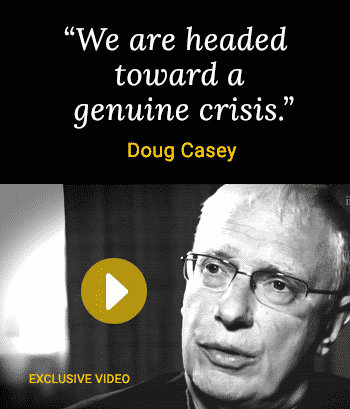What Type of “Flation” is Coming?
Will hyperinflation come to Europe and the US in the near future? Predictions are all over the board on this question, ranging from, “Yes, it is unavoidable at this point,” to, “It's not possible. They simply can't allow it to happen.”
This latter statement, while of questionable logic, is a very common one. I do not think I am overstating the situation by saying that we are presently facing the most dramatic period of economic change in the history of the world. Small wonder that there is so much uncertainty as to the outcome.
I am sorry to say that for us to tell ourselves that “They can't allow it to happen,” assumes a faith in the abilities of world leaders that greatly exceeds that which is actual. First, they will most certainly steer their nations in the direction of hyperinflation (as they have been doing for some time), as it amounts to delaying the inevitable, which is almost always the approach taken by politicians during difficult times. Second, it is very likely that we are already past the point of no return. As it presently stands, if we are to hope that, “They can't allow it to happen,” we are approaching a very adult problem like small children, pulling the covers over our heads.
There are many inflationists out there and, understandably, the number of hyperinflationists is much smaller. I believe that, to a degree, this is due to the fact that the very idea of hyperinflation is so frightful that, for many, it is beyond consideration. It should also be mentioned that there are a number of deflationists out there.
Each of these groups contains some very knowledgeable theorists who do, in fact, have their fingers firmly on the economic pulse. What, then, does this confusion over which will happen mean? Does it mean that, while these may be very capable people, they are predicting opposite effects, based on the very same data? Is the predictability of whether there will be inflation, hyperinflation or deflation (IHD) as impossible as deciding whether it will rain in London on Christmas day? Or, are we looking at a sort of “economic virus” – IHD – that carries a host of dramatic, but opposing economic symptoms?
As odd as it may seem, that's exactly the case. Perhaps the most confusing aspect of understanding “IHD” is that, in fact, whilst some theorists will be proven correct, and others wrong, in the coming years, we may indeed see inflation, hyperinflation and deflation.
An increasing number of people are concluding that the actions by the US and the EU countries have reached the point that the runaway economic train is close enough to the cliff that it cannot be stopped, no matter how hard the brakes are applied. The economies of the First World are headed over the cliff; it only remains to be seen what shape that will take. Assuming that this is so, we next examine how events may unfold.
Inflation
Inflation is the easiest symptom for all to agree on. In spite of the official rate of inflation, the data leading to these rates are skewed. Items such as food and fuel (the foremost essentials for most everyone) have been removed from some calculations, rendering the results meaningless. Studies that include these data report figures are roughly three times more than those without.
Hyperinflation
Historically, whenever a country reaches the level of indebtedness that now exists in Europe and, particularly, the US, hyperinflation becomes almost a certainty. It can correctly be argued that, as long as the government does not continue printing money at such a rapid pace, hyperinflation may be avoided. Trouble is, once a government does get to the present state, they almost always continue printing money.
The remaining question is when it may kick in. Governments can often delay the inevitable by continuing the same borrowing that is the root cause of the problem.
Due to continued monetary injections (such as the US's Quantitative Easing), any projection for a date for the onset of hyperinflation, in order to be meaningful, should be for the outside date of the onset. Whilst a prediction of the earliest possible date is likely to be inaccurate, the outside date proves far more useful.
John Williams, of Shadow Government Statistics, currently predicts 2014 as an outside date. His reasoning is as succinct as it is well-taken:
Why 2014? While inflation is far from being out of control at the moment, the U.S. dollar is relatively strong, due to the euro crisis, that can change rapidly as global markets and domestic holders of the U.S. currency begin to flee the dollar, along with dumping dollar-denominated assets. Fiscal, systemic-solvency and economic conditions are deteriorating markedly, with a confluence of unstable circumstances likely to come to a head within the next year or so, placing extremely heavy selling pressure on the U.S. dollar and, before 2014, setting the stage for hyperinflation.
Deflation
But what of the deflationists? There can be no question that some of the most reliable economic forecasters in the world today speak regularly of deflation. More confusingly, they often sprinkle their sentences with predictions of inflation, hyperinflation and deflation. So, which is it? Have we returned to the question posed above, “Is the predictability of whether there will be inflation, hyperinflation or deflation as impossible as deciding whether it will rain in London on Christmas day?”
In a word, “no.” For anyone seeking to understand the maze that is economic study, a principle often overlooked (due to the fact that it is rarely stated) is that inflation, hyperinflation and deflation can follow one another in the same catastrophic economic period. In fact, they can exist at the same time.
If the reader finds himself scratching his head at this concept, he is in good company. Even the very best of forecasters do the same. Whilst one may be regarded as a hyperinflationist and another may be accurately described as a deflationist, each one is fully aware that the coming period will contain elements of both. It's just that each tends to focus his study more on one aspect of the Greater Depression than the other.
A few examples of actual possibilities are in order.
First Scenario for Deflation
As a simple example, it is entirely likely that, should Greece leave the EU, and further bailouts are refused by the EU and other countries, the Greek government will very soon fail to pay its bills. More of the 700,000 government employees can be expected to be laid off. Such layoffs will have a direct impact on the volume of business in the private sector, leading to greater unemployment generally.
Thousands of Greeks will then be likely to try to exit their country in search of work. In short order, Greek products will be offered for lower prices in a desperate effort for companies, large and small, to remain in business. Wages will be cut, even if the central government refuses to officially sanction such cuts.
Hence, deflation will almost certainly occur in Greece at this time. In the meantime, across the pond in America, the Federal Reserve will do its utmost to assure that the Grecian deflation does not spread to the US. Mr. Bernanke has stated on numerous occasions his belief that the Great Depression was due largely to deflationary forces, and he unquestionably will respond to a deflationary threat by revving up the printing presses. Hence, further inflation in America, at the same time as deflation exists in Greece.
Second Scenario for Deflation
Looking once again to America, should there be a second crash of the stock market (as many, including yours truly, predict), there will be a further drop in the value of homes. (Estimates of up to 25% have been suggested.) At the same time, as Mr. Bernanke keeps the presses rolling, it is a near-certainty that commodities (particularly those that are most essential, such as food) will rise in price, in keeping with whatever level of printing occurs. This inflation will not be reflected in wages, however. (Historically, inflation in wages never keeps pace with inflation in commodities.) This means deflation of assets, against inflation in commodities, within the very same national economy.
Third Scenario for Deflation
Should hyperinflation occur, it takes on a life of its own and cannot be controlled, even by those who created it. Ultimately, the currency is destroyed, and there is massive unemployment. Concurrent problems, such as riots, squatters' rebellions, food shortages, black market sales and tax revolts, are likely.
Following such a collapse, deflation sets in. The scenario that we may soon see in Greece may serve as a template for America and the EU as a whole. The EU is likely to go down piecemeal, whilst the US, as a result of a lack of independence between its states, would topple more as a whole than as a series of states.
The above information is by no means exhaustive. If anything, it should be regarded as a thumbnail sketch of the “IHD virus” that is presently taking hold. It is intended as a starting point for those who wish to pursue the subject further. Most importantly, it is intended as background information for those who are in the process of planting flags in order to protect themselves against the effects of the coming economic storm.
Recommended subscriptions:
- International Speculator (Casey Research)
- Shadow Government Statistics (John Williams)
- Elliott Wave International (Bob Prechter)
(There are many other excellent sources for applicable information, but these four utilise varying methods in their research and, together, may provide the reader with a basic framework in assessing the subject on an ongoing basis.)
Tags:






